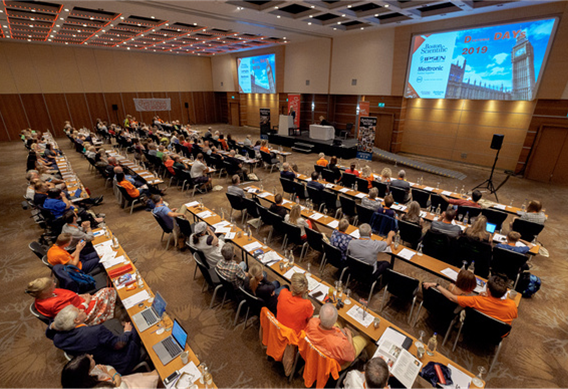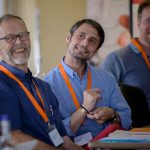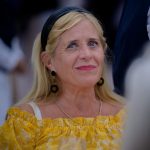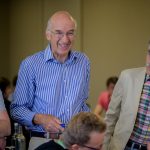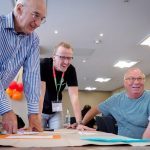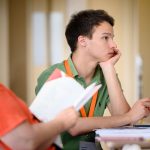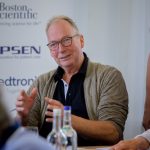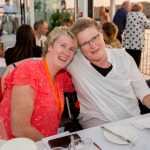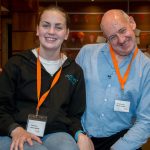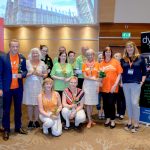The Dystonia Europe General Assembly was held on Friday 5th July, followed by a sightseeing trip and a dinner cruise on the river Thames in the afternoon. Delegates from the member countries, speakers and guests along with the The Dystonia Society board participated. DE received feedback that this was a great opportunity for the delegates in the member countries to network with other Delegates and medical professionals.
The actual Dystonia Day was held in collaboration with The Dystonia Society (TDS) on Saturday 6th July at Novotel Hotel Hammersmith, London. These D-DAYs we had the most participants so far, 178 patients, family members, medical and more, many of them members of TDS. The Dystonia Society had many volunteers, that along with the staff of TDS Andrea West and Dayna Ferdinandi, made sure that registration and welcoming all went very well.
Fiona Ross, Chairwoman of TDS and Merete Avery, President DE opened the conference, wishing everyone welcome, including those who followed us by live stream around the world. The Conference was divided into 4 main sections. Dystonia and Children, Dystonia from Adolescence to Young Adults, Dystonia in Adults, Research and Development.
In addition to the medical presentations by experts on dystonia and movement disorders, there were many patient stories at this conference. Sam is the parent of a child that is now 7 years old and they started to see that there was something different early on. The journey to find out what was wrong involved many visits to the physician. This was a very moving story of the struggle for a correct diagnosis which turned out to be generalized dystonia.
From feedback we received after the conference we understood that many participants appreciated the various dystonia stories presented as well as the medical presentations. To hear that you are not alone can be very helpful. Somebody else’s story can give new insights and hope.
Next were presentations on aids for people with dystonia and movement disorders. A personally designed wheelchair that assists the child to participate in activities can make a huge difference. It can contribute to the child being able to participate socially with other children and to some extent take part in activities with other children.
Professor Tom Warner, UCL Queen Square Institute of Neurology in London, presented the latest on research and development of treatment of dystonia. The most common treatment is botulinum toxin. Few medications have good effects. He also mentioned medical cannabis, but that there is no science based research that proves or indicates that it has any effect on dystonia. Tom also stated that physical therapy in addition to medical treatment have proven to be very effective in many cases. It is important than that the physical therapist has good knowledge of dystonia. DBS surgery can be very effective for more severe cases or cases that have little effect of botulinum toxin treatment. He also believes there can be huge progress within treatment in the future.
All presentations were livestreamed and video recorded and are available on the Dystonia Europe Youtube Channel: https://www.youtube.com/user/DystoniaEurope/videos .
Sunday morning was the last session for the D-DAYs 2020. There were Sharing Best Practices and a workshop on Strategy planning by Noemi Ambrus. After Noemi’s presentation we were divided into groups to work on the different elements of Strategy planning. There were many good discussions and ideas.
